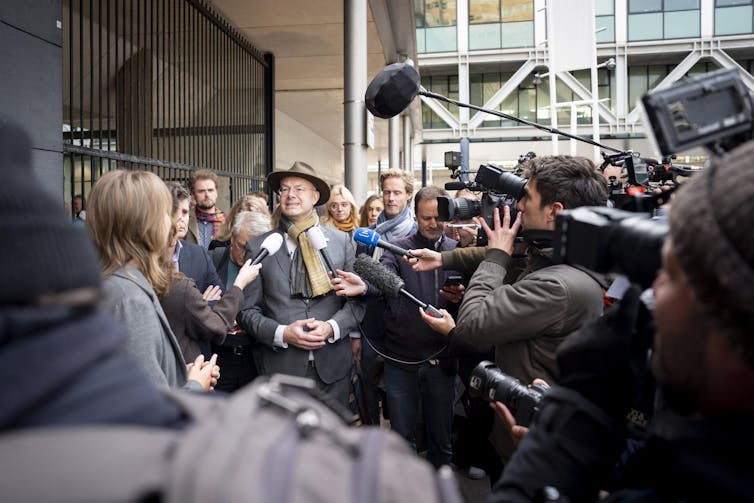By Asad Rehman, Amy Goodman
We are broadcasting live from the COP29 climate summit in Baku, Azerbaijan, which has entered its second and final week, and already there is frustration over a lack of progress on the key issue of financing the energy transition and climate adaptation in Global South countries. Asad Rehman, executive director of War on Want and lead spokesperson for the Climate Justice Coalition, says this year’s summit is supposed to be “the finance COP” and calls for about $5 trillion a year in financing, but “rich, developed countries are putting pennies on the table.” He also addresses the overwhelming presence of industry lobbyists at the annual summits and calls from some activists to boycott the talks. “If we, as civil society, weren’t here also holding the feet of Global North governments to the fire, we would see much worse outcomes than we are seeing already,” says Rehman.
This is a rush transcript. Copy may not be in its final form.
AMY GOODMAN: This is Democracy Now!, democracynow.org, The War and Peace Report. I’m Amy Goodman.
We’re broadcasting live from the United Nations climate summit here in Baku, Azerbaijan, which has entered its second and final week. There’s already frustration over a lack of progress on the key issue of financing the energy transition and climate adaptation in Global South countries. This comes after last year’s climate summit, COP28 in Dubai, where world leaders agreed to transition away from fossil fuels, after past summits just called for restrictions.
We just heard voices of protest. Now we’re joined by one of those people, Asad Rehman. He’s executive director of War on Want and lead spokesperson for the Climate Justice Coalition.
Well, another COP, another interview with you, Asad.
ASAD REHMAN: Yes.
AMY GOODMAN: We’re here in Azerbaijan, a leading petrostate in the world, following last year’s COP summit in another petrostate, in the United Arab Emirates. Can you talk about, for people who aren’t familiar with these U.N. gatherings, the significance of this, what you expect to come out of it, and what you’re seeing actually happen through this last week?
ASAD REHMAN: Well, Amy, the last time we spoke, I think it was in Dubai. The bombs were dropping on Gaza. We, as civil society, were standing in solidarity with our colleagues who were dying in Gaza, and saying, “We must stand up for human rights.” And a year later, of course, we have now the International Criminal Court, the International Court of Justice, countless human rights reports all talking about war crimes, crimes against humanity, a genocide taking place, genocide taking place in Gaza — and, of course, all with impunity and active complicity of some of the most powerful countries in the world — the United States, United Kingdom and the European Union. And the very rules of war — rules of the international rules system, multilateralism is being burnt to the ground. So we came in here with a very heavy heart. Our colleagues are still being killed. We see food being used as a weapon of war. The importance of human rights propelled us to, of course, use this moment to raise our voice and still call for a ceasefire and, of course, call for end to complicity.
But the negotiation themselves, it’s often been called the finance COP. And the reason why it’s called the finance COP is this COP is meant to agree what the next quantum, which is the collective goal of money that is meant to be provided from the Global North to the Global South because of the responsibility of the Global North for causing this crisis — and what that figure will be, what the quality of that money will be. Will it be in public finance, or will it be in debt-created loans? Will it be in private finance? All of these things are being thought out over here in week one and in week two.
AMY GOODMAN: So, I want to ask why you’re here and why so many thousands of people have come to this climate summit. Prominent climate activist Greta Thunberg announced last week she’s not attending this COP summit over Azerbaijan’s climate and human rights record. She spoke Friday in Yerevan, Armenia.
GRETA THUNBERG: I think we have to stop pretending that conferences like the COP, that currently are not leading to any even close to meaningful climate action that we need — for example, last year, we saw an all-time high of greenhouse gas emissions, and 2024 is set to be the hottest year ever recorded. These COP processes are failing us. … Having these conferences as greenwash platforms for politicians to pretend that they’re taking action, of course, it’s also greenwashing the human rights abuses that these countries are committing. So, it’s both greenwashing and greenwashing the climate action and greenwashing their ethnic cleansing.
AMY GOODMAN: So, that’s Greta Thunberg, the well-known Swedish climate and human rights activist. Asad Rehman, you made a different decision.
ASAD REHMAN: Yes, because I see these spaces as fundamentally being about a question about power. We know that the rich and powerful have got way more power than ordinary people, and this is a contested space. And we have to build our power, make sure our politicians act in our interests, in the interests of the planet, and not of the rich and the elite and big business. And that’s true at national level as in a global level.
But it is important that we’re here, because we’re the ears, eyes and voice of those on the frontlines. Many people come here with the hard evidence to try and influence these negotiations. And knowing the imbalance of power that exists between the richest nations and developing countries, if we, as civil society, weren’t here also holding the feet of Global North governments to the fire, we would see much worse outcomes than we are seeing already.
AMY GOODMAN: So, I wanted to play another clip. This is of Azerbaijan’s minister of ecology and natural resources. Mukhtar Babayev is COP29’s president. Previously, he spent 26 years at the State Oil Company of the Azerbaijan Republic, known as SOCAR. Ahead of the summit, the group Global Witness released covert recordings of Azerbaijan’s COP29 chief executive, Elnur Soltanov, promoting possible fossil fuel deals with someone, well, posing as an investor. The fake investor told Soltanov they were considering sponsoring COP29 in exchange for deals with Azerbaijan’s state energy firm SOCAR. This is Soltanov.
ELNUR SOLTANOV: As I said, we have a lot of pipeline infrastructure. We have a lot of gas fields that are to be developed. We have a lot of green projects that SOCAR is very interested in. There are a lot of joint ventures that could be established, potential joint ventures. Our SOCAR trading is trading oil and gas all over the world, including in Asia. So, to me, these are the possibilities to explore.
AMY GOODMAN: So, while it’s so critical — again, that was Soltanov thinking he was talking to a fossil fuel exec. In fact, it was someone from Global Witness. But you have at this COP — you could consider them a delegation — the largest delegation here, and that’s of fossil fuel lobbyists. And you have this chief executive making fuel and oil deals while he’s here. So, why do you think you can have an effect, as you talk about the imbalance of power, Asad?
ASAD REHMAN: Well, those very same lobbyists are, of course, affecting our decisions of government at national level as they are at global level. They, of course, want to turn this climate negotiations into a trade fair. They’re coming here to try and strike deals, make bargains and, of course, propose their solutions. You see these lobbyists here calling for carbon capture and storage — unproven, deadly and dangerous technologies — as solutions to the climate crisis.
It’s up to us to be opposing them, to put forward real solutions, to be supporting governments who do want to do the right thing, and say, “We are going to amplify your voice. We’re going to support you. We’re going to raise these issues.” And we’re going to build our movement’s power and make sure we’re making the right call.
AMY GOODMAN: So, the theme is financing. I was just talking to a Kenyan journalist who said Africa is faring very badly here. You’re not wearing the regular COP lanyard. You’re wearing one that says “pay up”?
ASAD REHMAN: “Pay up.” Global civil society came together, and we looked at what the true costs of supporting developing countries to be able to grow cleanly, what the cost of adapting to the climate crisis was, how much the damages were already overwhelming countries in the Global South, and we calculated that that is about $5 trillion a year that the Global North would need to provide to the Global South. That’s just a down payment in the overall cost.
And so, we came here and say, “Look, the only way we’re going to be able to transition fairly, cleanly, the only way that people in the Global South will have the same right to live with dignified lives as people in the Global North, if we have finance and technology being provided.” We made the call for $5 trillion. Developing countries came here and said, “At a base level, the lowest number, we must have $1.4 trillion a year.”
Rich, developed countries are putting pennies on the table. They’re not even talking about billions. They’re talking the private sector will provide this finance. “Open your economies to our big corporations. They will be the answer.” And we know they deliver nothing, nothing in terms of climate action. And, of course, their only goal is to make profit.
AMY GOODMAN: Asad Rehman, we want to thank you for being with us, executive director of War on Want, lead spokesperson for the Climate Justice Coalition.











